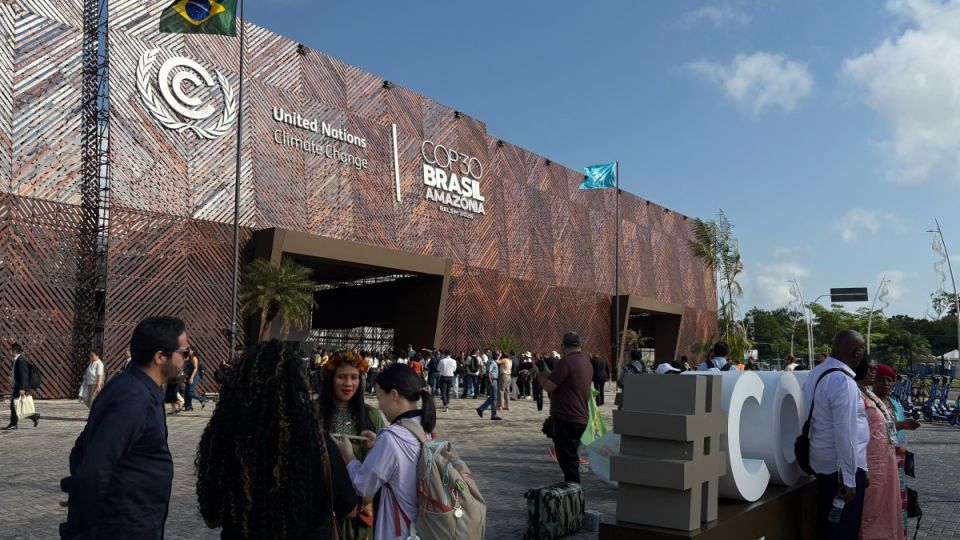November 12, 2025
JAKARTA – As the United Nations climate change conference kicks off in Brazil, Indonesia’s climate commitment has once again come under scrutiny as the delegation prioritizes economic gains above genuine environmental protection by championing carbon trading as part of climate mitigation efforts, raising concerns of commercialization of land and forests.
Tens of thousands of delegates from 195 countries gathered on Monday in the Brazilian city of Belém to kick off this year’s UN climate change conference, also known as the COP30. For the next two weeks, diplomats and climate experts will discuss various climate issues, from green fuel transition to funding climate mitigation and adaptation efforts.
Among the countries present in Belém is Indonesia, whose delegation, led by President Prabowo Subianto’s brother and tycoon Hashim Djojohadikusumo, opened the Indonesia Pavilion on Monday.
During the opening ceremony, the delegation announced a target of reaching an annual US$7.7 billion from carbon trading, prioritizing the market-based mechanism in the country’s climate agenda.
“Our vision is to make Indonesia as a global center for a high-integrity carbon market, contributing to real and measurable climate action, as well as creating green job openings, sustainable livelihoods and resilient communities,” said Hashim, who is also a special presidential envoy on energy and environment, as quoted by a statement from the Forestry Ministry on Monday.
Read also: Indonesia’s ‘weak’ climate pledge lambasted
Carbon trading refers to a mechanism that allows governments or companies to sell or buy “carbon credits”, with each credit typically representing 1,000 kilograms of carbon dioxide equivalent (CO2e) of greenhouse gas emissions they produce. Those who emit less than the allowed limit can sell their excess of carbon credits to those exceeding their quota.
In a separate statement, the Environment Ministry said this would be the first time for Indonesia to sell its carbon credit overseas, given the government previously issued a moratorium on international carbon trading for four years. Prabowo revoked the prohibition through a presidential regulation signed in October.
Indonesia would offer 90 million carbon credits at its pavilion in COP30, the ministry added.
“Carbon market is not merely an economic transaction. It is our way to uphold integrity and build global trust on our carbon system in Indonesia,” Environment Minister Hanif Faisol Nurofiq said in the Environment Ministry’s statement on Monday.
Money first
But championing carbon trading means that Indonesia is allowing big polluters to keep emitting greenhouse gas, rather than pushing for a change that would reduce their emissions; a move called “greenwashing”, according to Iqbal Damanik, Greenpeace Indonesia’s climate and energy manager.
Instead of showcasing real climate actions, such as phasing out fossil fuels and measurable decarbonization, Iqbal said Indonesia has put too much attention on irrelevant strategies in tackling the impacts of the climate crisis.
“It shows that Indonesia’s climate policy orientation is to generate money,” he said on Tuesday, warning carbon trading could open further commercialization of land and forest across the country.
Environmental group coalition People’s Alliance for Climate Justice (ARUKI) also slammed the carbon trading announcement, calling it a “false climate solution” for Indonesia, whose climate mitigation efforts keep turning blind eye to eliminating fossil fuels that greatly contribute to the country’s greenhouse gas emissions.
The alliance called for greater attention to the rights of those who are often neglected in the climate mitigation strategy, such as indigenous people and local communities.
If not well-managed, the carbon trading would risk creating new hotspots of agrarian conflict, said Torry Kuswardono, executive director of Pikul Foundation, an environmental group part of the ARUKI.
“The government should have first acknowledged the rights of local and indigenous communities before launching the carbon market,” Torry said on Tuesday.
“Sometimes, land and forest areas designated for carbon projects often overlap with customary territories […] thus it could increase the risk of conflict.”
Read also: UK, Indonesia sign MoU to strengthen climate change mitigation at COP30
With Indonesia’s latest climate commitment already considered weak, Torry argued that Indonesia should have been focusing on cutting emissions, rather than developing a carbon market that still sees low trading demand.
Indonesia’s second nationally determined contribution (SNDC), a document submitted to the UN outlining the country’s emissions reduction targets between 2030 and 2035, has been lambasted by environmentalists for showing “weak” commitments in phasing out fossil fuels.
“Instead of selling carbon credits to big polluters,” Torry said, “Indonesia should demand a deep emissions reduction from them.”


